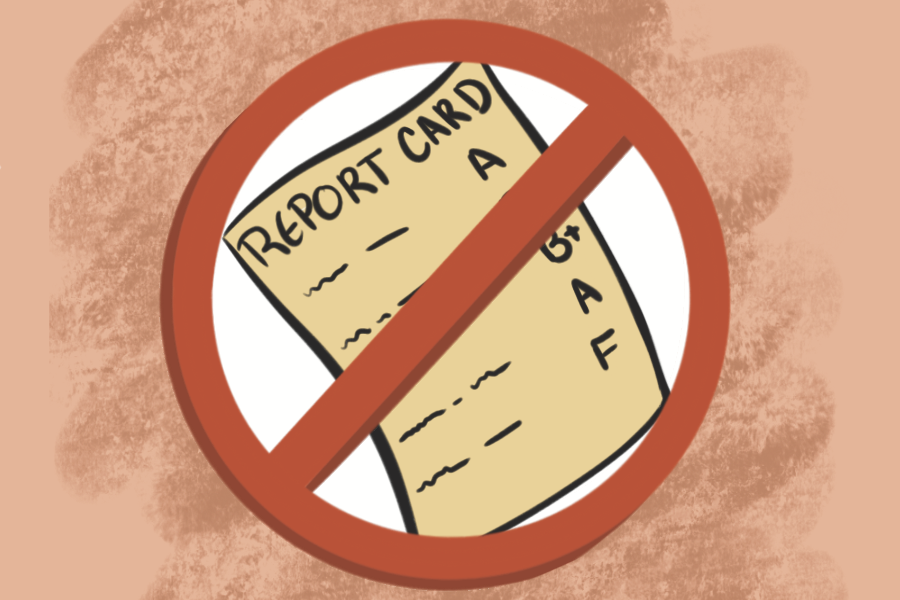Opinion | Letter grades are a relic of the past
April 6, 2023
Students are stressed, struggling and shedding tears. They are constantly checking their grades and obsessing over their GPA.
From a young age, children are taught to get good grades. Straight-A students are praised for their diligence and intelligence. Children fear the punishment they will receive from their parents if they bring home anything less than a superb report card.
Now, we are questioning whether grades really measure a person’s intelligence.
An NPR article from 2020 reported on schools in the suburbs of Chicago changing their grading systems. Instead of the A-F system, the Winnetka Public School District implemented a standards-based grading system for grades K-7.
This method is focused on skill development, to emphasize the importance of learning. Grading is broken down into each skill of a topic. For example, if the subject is math, a student might be graded on how well they can add double digit numbers. The report card is more detailed, rather than just giving one grade for a class, it includes the proficiency levels for all the skills in that subject.
Get The Daily Illini in your inbox!
The process of getting rid of letter grades has trended online, coined as “ungrading.”
The A-F grading system has been the standard since the 1940s. The majority of people in the U.S. right now – starting with baby boomers – grew up with this system. This makes it harder for some schools to change their grading system.
When people have grown up with A-F grading, it can be harder for them to accept a new type of grading that might seem more relaxed.
However, there has long been dissatisfaction in the school system. A Gallup poll reported that between 1999 and 2022, the number of people “somewhat dissatisfied” and “completely dissatisfied” in the quality of education from K-12 ranged from 45-55%. With dissatisfaction rates at that high for that long, schools should be reevaluating their methods.
The ungrading process is not just happening in Illinois, but in states across the country.
The Michigan House of Representatives recently voted in favor of a bill that will get rid of letter grades and rankings in public schools.
In Utah, a bill is in action to end the letter grade system for public schools. The same bill has been pushed in the past and did not pass. Now that there is support from 24 legislators in the House and the Senate, the future of the bill looks more promising.
While the aforementioned changes are all at a lower education level, they are also happening at the collegiate level. Another NPR article from March 2023 spoke of ungrading for college freshmen as a way to help them adapt to their new, independent lifestyle. The biggest reason is to help students focus on learning instead of grades.
At the University of Michigan-Dearborn, associate professor Emily Luxon has been testing ungrading with her students since about 2021. She has noticed that her students are learning more, especially those who had struggled in the past. Luxon said that ungrading her class has allowed for more flexibility, which helps students succeed.
Two professors at the University have tried implementing ungrading in their own classes. The University should consider expanding this to even more different departments and doing more trials to see how students react to this change. It is imperative that education is accessible and enriching for all students; changing how classes are structured could help students be more engaged.
Learning should be prioritized. When grades get in the way, students are not able to perform their best. Between the increasing mental health problems among students and excessive importance placed on grades, the ungrading system proposes a positive solution for student learning.
Removing letter grades has the potential to help students stop obsessing over grades and start wanting to learn again.
Maggie is a sophomore in Media.
mknutte2@dailyillini.com







